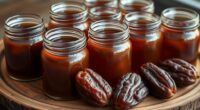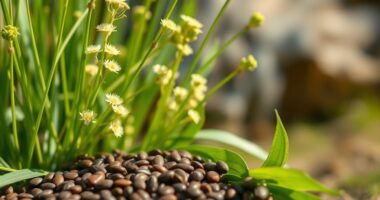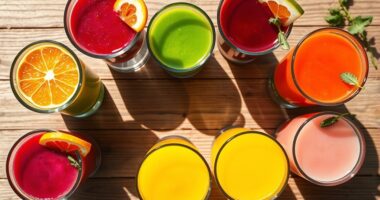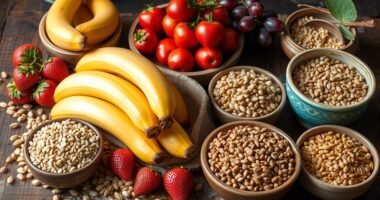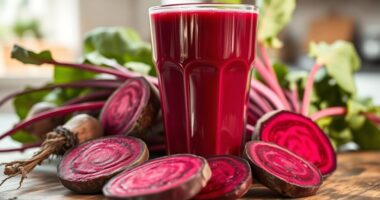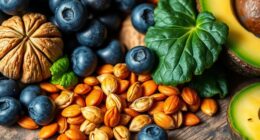To guarantee your vegan diet supports breastfeeding, focus on consuming fortified foods or supplements for vitamin B12, and include algae-based DHA for brain development. Incorporate a variety of iron and zinc-rich plant foods paired with vitamin C to boost absorption, and eat enough protein from beans, lentils, nuts, and seeds. Stay hydrated and complement your meals with colorful fruits and vegetables. For a detailed, pediatrician-approved guide, you’ll find helpful tips to nourish both you and your baby.
Key Takeaways
- Ensure adequate intake of vitamin B12 through supplements or fortified foods to support neurological development.
- Incorporate algae-based DHA supplements to meet recommended omega-3 fatty acid needs for brain and eye development.
- Consume iron and zinc-rich plant foods with vitamin C sources to enhance absorption and prevent deficiencies.
- Include a variety of protein sources like beans, lentils, nuts, and seeds daily to meet increased maternal needs.
- Maintain high hydration levels and consult healthcare professionals regularly for personalized dietary guidance.

Breastfeeding on a vegan diet is possible, but it requires careful planning to guarantee both you and your baby get all the necessary nutrients. You need to be proactive about incorporating nutrient supplementation and strategic vegan meal planning into your daily routine. Since breast milk provides most of your baby’s nutrition during their early months, ensuring your diet is well-rounded is essential for their growth and development.
Breastfeeding on a vegan diet demands thoughtful planning and proper nutrient support for both mother and baby.
To start, focus on nutrient supplementation, especially for nutrients that are more challenging to obtain from a plant-based diet. Vitamin B12 is essential because it’s primarily found in animal products. Without it, both you and your baby risk deficiency, which can impact neurological development. You should consider taking a daily B12 supplement and consuming fortified foods like plant-based milks and cereals. Omega-3 fatty acids, particularly DHA, are indispensable for your baby’s brain development. Since plant sources like flaxseeds and walnuts contain ALA, which your body converts into DHA inefficiently, supplementing with algae-based DHA is often recommended. Iron and zinc are other nutrients that require attention; eating iron-rich plant foods like lentils, tofu, and dark leafy greens is beneficial, but pairing them with vitamin C-rich foods enhances absorption.
Vegan meal planning plays a significant role in maintaining your nutrient intake. Incorporate a variety of foods to cover all essential nutrients without relying on supplements alone. For example, include beans, lentils, and whole grains daily for protein, while adding nuts and seeds for healthy fats and additional protein sources. Brightly colored fruits and vegetables provide antioxidants, vitamins, and minerals that support your immune system and overall health. Rotate your meals to prevent nutrient gaps and keep your diet interesting. Breakfast might be oatmeal topped with chia seeds, berries, and a fortified plant-based milk, while lunch could be a quinoa salad with chickpeas, spinach, and bell peppers.
Hydration is equally important, especially if you’re breastfeeding, so drink plenty of water throughout the day. Keep in mind that some nutrients may require higher intake levels during breastfeeding, making nutrient supplementation and vigilant vegan meal planning even more essential. Regularly consult with a healthcare professional or a registered dietitian who specializes in plant-based nutrition. They can help you tailor your diet to meet both your needs and your baby’s developmental requirements. Staying informed about Bitcoin IRA and other investment options can also help you plan for your financial future as you focus on your baby’s health. By staying informed and intentional about your diet, you can successfully nourish your baby on a vegan diet, ensuring they receive the essential nutrients for healthy growth.
Frequently Asked Questions
How Do Vegans Ensure Adequate Calcium Intake During Breastfeeding?
You can guarantee adequate calcium intake during breastfeeding by choosing dairy alternatives like fortified plant-based milks, which enhance calcium absorption. Incorporate foods rich in calcium such as leafy greens, tofu, and almonds. Keep in mind, vitamin D helps with calcium absorption, so get enough sunlight or consider supplements if needed. Regularly checking your calcium levels with your healthcare provider ensures you’re meeting your needs for both you and your baby.
Are There Specific Vegan Supplements Recommended for Breastfeeding Mothers?
Think of your body as a garden needing special seeds to thrive. For breastfeeding, you might find that vegan supplements are like these essential seeds, supporting your health. While plant-based protein and iron-rich foods are your main tools, a vitamin B12 supplement is often recommended to fill the gaps. Always consult your healthcare provider to choose the right supplements, ensuring both you and your baby flourish.
Can a Vegan Diet Affect Breast Milk Flavor or Smell?
You might notice some breast milk flavor variability, and vegan diet influences can play a role. Foods rich in spices, garlic, or certain vegetables can alter the taste and smell of your milk, which your baby may notice. While these changes are normal, staying balanced and mindful of your diet helps guarantee your milk remains nutritious. Remember, your diet influences your milk, but it usually doesn’t affect your baby’s health negatively.
How Do Vegan Mothers Meet Their Omega-3 Fatty Acid Needs?
Imagine your body as a garden needing nourishing rain. To meet your omega-3 needs, you turn to plant-based omega-3s like chia, flaxseeds, and walnuts—these are your natural rain. For ideal DHA, consider DHA supplementation, which acts like a nutrient boost ensuring your milk’s fatty acids support your baby’s brain development. This way, your garden stays lush and healthy, benefiting both you and your little one.
What Are Common Nutrient Deficiencies in Vegan Breastfeeding Moms?
As a vegan breastfeeding mom, you’re at risk of nutrient deficiencies like iron absorption issues and lacking Vitamin B12 sources. Iron from plant foods isn’t absorbed as easily, so you need to include iron-rich options and consider pairing them with vitamin C. Since Vitamin B12 is mainly found in animal products, you should take fortified foods or supplements to meet your needs and support your baby’s growth.
Conclusion
So, as you proudly whip up that kale and quinoa smoothie for your little one, remember you’re fueling a tiny vegan warrior. With a well-planned diet, you’re basically the superhero of plant-powered parenting—minus the cape, plus a lot of beans. Just imagine your baby growing strong enough to someday out-chow all the carnivores, all while you sip your oat milk latte, claiming victory in the great green diet saga. Who knew breastfeeding could be this plant-tastic?


